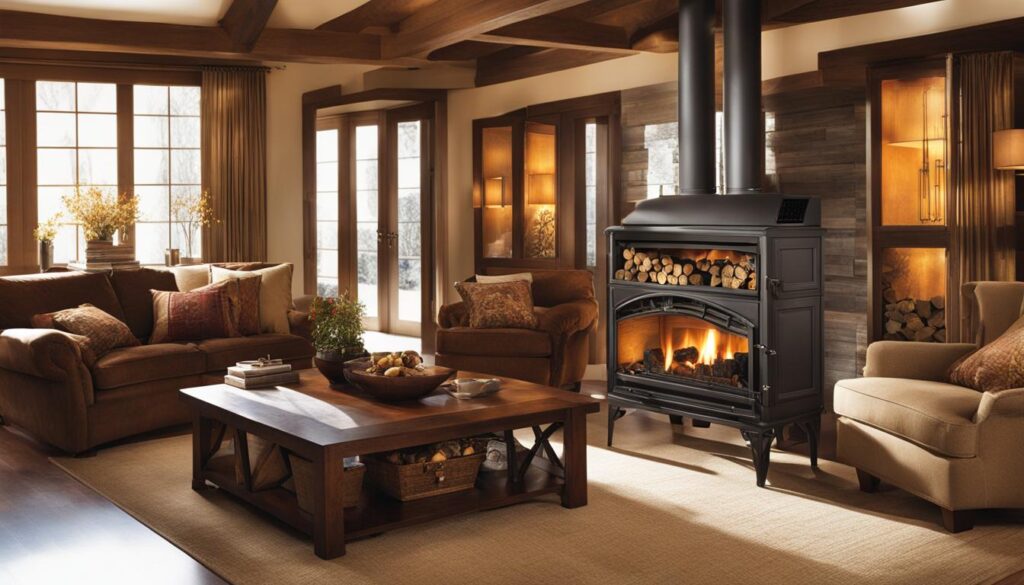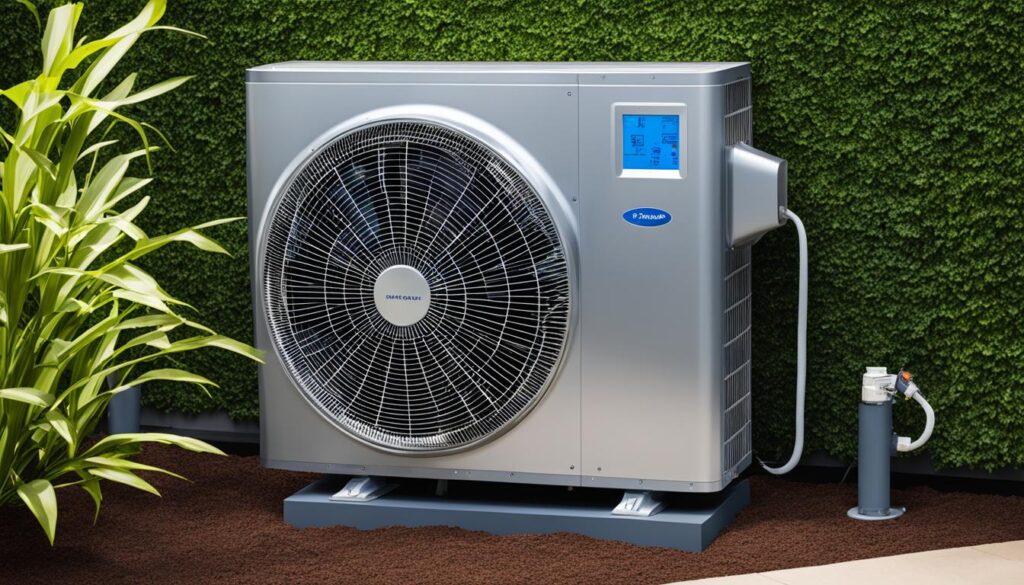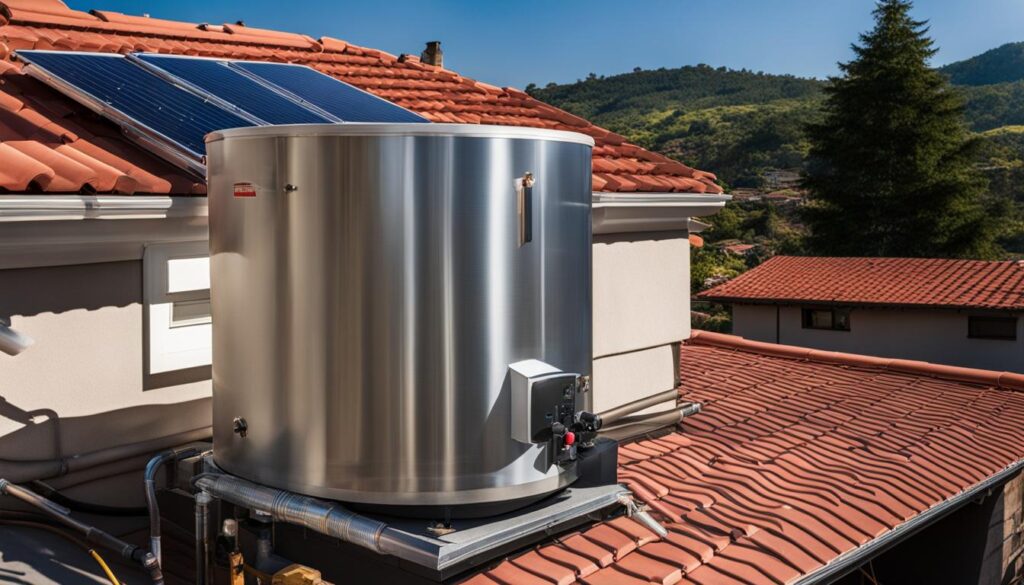Solar water heaters are becoming an increasingly popular choice for eco-friendly heating. By harnessing the power of the sun, these systems offer numerous benefits such as energy efficiency, cost savings, and the use of renewable energy.
When it comes to benefits, solar water heaters are at the top of the list. They not only provide an eco-friendly heating solution but also help reduce dependency on traditional energy sources. By utilizing solar power, these systems contribute to a greener and more sustainable environment.
The energy efficiency of solar water heaters is another major advantage. By using the sun’s free and abundant energy, these systems can heat water at a significantly lower cost compared to conventional methods. This leads to substantial savings on your energy bills in the long run.
Cost savings are a key factor that attracts many homeowners to solar water heaters. While the initial investment may be higher than traditional systems, the long-term savings in energy costs can outweigh the upfront expenses. This makes solar water heaters a cost-effective choice in the long term.
Furthermore, by utilizing solar power, these systems are not subject to fluctuating energy prices. As the sun’s energy is renewable and abundant, it provides a stable and reliable source of heat, giving you peace of mind and stable energy costs.
However, it’s important to consider the limitations of solar water heaters as well. One of the main drawbacks is their dependence on sunny weather. Cloudy or overcast days can reduce the effectiveness of these systems, impacting their performance and overall heating efficiency.
Another consideration is the initial installation cost. Solar water heaters require a certain level of investment upfront, including the cost of the equipment and installation. While the long-term savings can offset this initial expense, it’s essential to factor in the budget and financial feasibility of installing a solar water heating system.
Despite these limitations, solar water heaters remain a viable and eco-friendly option for heating water. By taking advantage of renewable energy and prioritizing energy efficiency, they offer a sustainable heating solution that benefits both the environment and your wallet.
Key Takeaways:
- Solar water heaters provide eco-friendly heating using renewable energy sources.
- They offer energy efficiency and significant cost savings in the long run.
- Dependence on sunny weather and high initial installation costs are important considerations.
- Despite limitations, solar water heaters contribute to a greener and more sustainable environment.
- By utilizing solar power, these systems provide stable and reliable heat with stable energy costs.
Understanding Heating Systems and Their Importance
When the chilly weather sets in, we rely on heating systems to create a comfortable and cozy indoor environment. These essential systems ensure that we can enjoy a warm and inviting space, regardless of the freezing temperatures outside.
Heating systems play a crucial role in maintaining a comfortable temperature inside our homes. They provide the much-needed warmth that allows us to relax, stay productive, and spend quality time with our loved ones. Whether it’s a cold winter night or a frosty morning, heating systems are there to keep us cozy and snug.
To illustrate the importance of heating systems, imagine coming home after a long day in the cold. As you step inside, you’re greeted by a blast of warmth that immediately soothes your senses. The discomfort of the chilly outdoors melts away, replaced by a comforting atmosphere. This warm haven not only provides physical comfort but also contributes to our overall well-being and happiness.
Heating systems come in various types, each with its own merits and functionality. From central heating systems that distribute heat throughout the entire house to compact wall heaters that are perfect for smaller spaces, there are plenty of options available to suit different needs and preferences.
It’s important to understand the different heating systems available and their specific advantages and disadvantages to make an informed decision. By selecting the right heating system for our homes, we can create a welcoming oasis in even the coldest of weather.
Stay tuned as we explore different types of heating systems and delve into their features, benefits, and considerations. Let’s embark on a journey to discover the perfect heating solution that will keep you warm and comfortable throughout the chilly seasons.
Comparison of Heating Systems
| Heating System | Advantages | Disadvantages |
|---|---|---|
| Central Heating | Provides consistent heat throughout the house | Initial installation costs can be high |
| Furnaces | Efficient and cost-effective | Requires regular maintenance |
| Heat Pumps | Offers both heating and cooling functions | Less effective in extremely cold climates |
| Boilers | Efficient heating with hot water circulation | Requires space for installation |
Types of Heating Systems: Central Heating

When it comes to heating homes, central heating systems are a popular choice. These systems work by producing heat at a central point and distributing it throughout the entire house. By doing so, they ensure that every room stays warm and comfortable, even during the coldest winter days.
There are several types of central heating systems commonly found in residential properties:
- Furnaces: Furnaces are a traditional type of central heating system that burn fuel, such as natural gas or heating oil, to produce heat. The heat is then distributed through ductwork to various rooms in the house. Furnaces are known for their efficiency and reliability.
- Heat Pumps: Heat pumps are versatile heating systems that can both heat and cool a home. They work by extracting heat from the outside air or the ground and transferring it indoors. Heat pumps are efficient and environmentally friendly, making them a popular choice for homeowners.
- Boilers: Boilers are heating systems that use water or steam to distribute heat throughout a home. The water or steam is heated in a central boiler unit and then circulated through pipes or radiators. Boilers are known for their even heat distribution and durability.
Each type of central heating system has its own advantages and considerations. By understanding the differences between them, homeowners can make an informed decision about the best option for their needs.
The image above highlights the different types of central heating systems and how they function to distribute heat effectively throughout a home.
Exploring Furnaces: Powerhouses of Heat
Furnaces are essential heating systems that generate heat using natural gas, making them highly efficient and cost-effective. With their ability to provide consistent heating, furnaces are widely used in residential and commercial spaces to keep occupants warm and comfortable during colder months.
One of the key benefits of furnaces is their energy efficiency, which can help reduce energy consumption and lower utility bills. By efficiently converting natural gas into heat, furnaces allow homeowners to maximize the use of their energy resources and contribute to a more sustainable future.
To maintain the efficiency and lifespan of furnaces, regular maintenance is crucial. Routine servicing, such as cleaning or replacing filters, checking for gas leaks, and inspecting the overall system, ensures optimal performance and prevents any potential issues.
When it comes to the lifespan of furnaces, proper care and maintenance play a significant role. On average, a well-maintained furnace can last anywhere between 15 to 20 years, depending on usage and environmental conditions. Regular inspections and tune-ups can extend the lifespan of furnaces, providing long-term value for homeowners.
Benefits of Furnaces:
- High energy efficiency
- Cost savings
- Consistent and reliable heat
- Large coverage area
Maintenance Tips for Furnaces:
- Schedule annual maintenance with a certified technician
- Replace or clean filters regularly
- Check for gas leaks
- Inspect the system for any signs of wear and tear
Investing in a quality furnace and ensuring its proper maintenance can provide homeowners with efficient heating, cost savings, and peace of mind. With their impressive performance and long lifespan, furnaces remain a reliable choice for keeping homes warm and comfortable throughout the winter season.
| Advantages | Disadvantages |
|---|---|
| High energy efficiency | Dependence on natural gas supply |
| Lower utility bills | Potential for gas leaks if not properly maintained |
| Consistent and reliable heat | Initial installation cost |
| Long lifespan | Regular maintenance required |
Regular maintenance and proper care are essential to ensure the longevity and efficiency of furnaces. By choosing furnaces powered by natural gas and following maintenance guidelines, homeowners can enjoy the benefits of energy-efficient heating while minimizing environmental impact and maximizing cost savings.
Understanding Heat Pumps: Dual-Purpose Climate Controllers

Heat pumps are advanced heating and cooling systems that offer dual functionality, making them a versatile choice for homeowners. These innovative devices provide both heating during the colder months and cooling during the warmer months, ensuring year-round comfort in your home.
Heat pumps work on the principle of reverse cycle technology. They extract heat from the outdoor air (even in low temperatures) or the ground, and then transfer it indoors to warm your living space. This process is reversed when cooling is required, where heat is extracted from your home and released outside, resulting in a pleasant indoor temperature.
Heat pumps are an energy-efficient solution for maintaining comfortable indoor temperatures throughout the year. By harnessing the existing heat in the environment, they offer significant energy savings compared to traditional heating and cooling systems.
One of the key advantages of heat pumps is their exceptional energy efficiency. These systems can produce up to 3-4 units of heat for every unit of electricity consumed, resulting in substantial cost savings on your energy bills. Additionally, heat pumps contribute to sustainability efforts by reducing greenhouse gas emissions and dependence on fossil fuels.
Benefits of Heat Pumps:
- Energy Efficiency: Heat pumps provide efficient heating and cooling, resulting in reduced energy consumption and cost savings.
- Year-Round Comfort: Enjoy warmth in winter and coolness in summer with a single system.
- Lower Environmental Impact: Heat pumps utilize renewable energy sources, reducing carbon emissions and promoting sustainability.
- Long-Term Savings: While heat pump installations may have higher upfront costs, the energy savings over time can offset the initial investment.
When considering a heat pump for your home, it’s important to evaluate factors such as the climate in your area, the size of your home, and your specific heating and cooling needs. Additionally, professional installation and regular maintenance are crucial to ensure optimal performance and longevity of your heat pump system.
By understanding the benefits and functionality of heat pumps, you can make an informed decision when it comes to selecting a heating and cooling system for your home. With their ability to provide efficient, cost-effective, and sustainable climate control, heat pumps are an excellent option for homeowners seeking year-round comfort.
Examining Boilers: Delivering Heat Through Hot Water
Boilers are an efficient and effective way to heat your home by using hot water to distribute heat throughout your living space. They work by heating water, which then circulates through a system of pipes and radiators, providing warmth and comfort in every room. Boilers are a popular choice for homeowners due to their reliability, versatility, and ability to deliver consistent heat.
There are several types of boilers available, each with its own advantages and considerations. Let’s explore the different types:
1. Traditional Boilers
Cost: Traditional boilers can be a cost-effective option, especially if there is an existing heating system in place.
Efficiency: While traditional boilers are reliable, their efficiency may vary depending on their age and maintenance.
Lifespan: With proper maintenance, traditional boilers can last between 10 to 15 years.
2. Combination Boilers
Cost: Combination boilers are generally more expensive upfront, but they can provide cost savings in the long run due to their energy efficiency.
Efficiency: Combination boilers are highly efficient as they heat water on-demand, providing hot water whenever needed.
Lifespan: Combination boilers typically have a lifespan of 10 to 15 years.
3. System Boilers
Cost: System boilers are typically more expensive than traditional boilers but can offer cost savings by providing hot water without the need for a separate water tank.
Efficiency: System boilers are highly efficient as they incorporate a heat exchanger to maximize energy usage.
Lifespan: With proper maintenance, system boilers can last between 10 to 15 years.
When choosing a boiler, it’s important to consider factors such as cost, efficiency, and lifespan. Additionally, ensure that the boiler you select is appropriate for the size of your home and meets your specific heating needs. Consulting with a professional heating contractor can help you make an informed decision and ensure a proper installation.
Boilers play a vital role in providing effective, reliable, and energy-efficient heating for your home. Whether you opt for a traditional boiler, a combination boiler, or a system boiler, you can enjoy the benefits of a comfortable living space. Remember to schedule regular maintenance to keep your boiler functioning optimally for years to come.
Exploring Space Heaters: Portable Providers of Localized Heat

When it comes to heating small areas or adding supplemental warmth to a room, space heaters are the perfect solution. These portable heating devices offer localized heat in a convenient and efficient manner. Let’s delve into the different types of space heaters, their advantages, disadvantages, safety considerations, and energy consumption.
Types of Space Heaters
Space heaters come in various types, each with its unique features and heating mechanisms. Let’s take a closer look at the most common types:
- Fan-forced heaters: These space heaters utilize an internal fan to circulate warm air throughout the room. They are quick to heat up the space and provide instant warmth.
- Oil-filled heaters: These heaters use heated oil as a heat transfer medium. They provide a gentle and consistent heat that lasts even after the heater is turned off.
- Infrared heaters: Infrared heaters emit infrared radiation that directly heats objects and people in the room. They are known for their energy efficiency and targeted heat delivery.
Advantages of Space Heaters
Space heaters offer several advantages that make them a popular choice for localized heating needs. Some of the key benefits include:
- Portability: Space heaters are compact and portable, allowing you to move them around as needed.
- Instant heat: These heaters provide immediate warmth, making them ideal for quickly heating up a room.
- Cost-effective: Space heaters can help reduce energy consumption by allowing you to heat only the specific area you need, thereby saving on overall heating costs.
Disadvantages and Safety Considerations
While space heaters offer convenience and energy efficiency, they also have some drawbacks that should be taken into account:
- Higher energy consumption: Space heaters can consume more energy compared to central heating systems, potentially leading to increased utility bills.
- Fire risk: Improper use or placement of space heaters can pose a fire hazard. It’s essential to keep flammable materials away from the heater and never leave it unattended.
- Burn risks: Some types of space heaters, such as radiant heaters, can reach high surface temperatures, increasing the risk of burns. Caution should be exercised, especially when there are children or pets in the vicinity.
“Space heaters provide quick and localized heat, making them a popular choice for targeted heating needs. However, it’s crucial to use them responsibly and follow safety precautions to avoid potential hazards.”
Energy Consumption
The energy consumption of space heaters can vary depending on the type, usage, and wattage. It is important to consider their energy efficiency to minimize unnecessary energy consumption and associated costs. When using a space heater, it’s advisable to keep doors and windows closed to prevent heat loss and maximize energy efficiency.
| Space Heater Type | Energy Consumption |
|---|---|
| Fan-forced heaters | High |
| Oil-filled heaters | Moderate |
| Infrared heaters | Low |
Note: The energy consumption values mentioned above are general estimates and may vary based on specific models and usage patterns.
Space heaters can provide a convenient and efficient way to heat small areas or supplement existing heating systems. However, it’s important to weigh the advantages and disadvantages, prioritize safety, and consider energy consumption before choosing a space heater for your heating needs.
Examining Wall Heaters: Compact Units for Smaller Spaces
Wall heaters are a practical heating solution for smaller spaces where central heating systems may not be suitable. These compact heating units are designed to be installed directly into walls, providing efficient and localized heating. Whether you have limited space or specific heating requirements, wall heaters offer several advantages.
Easy Installation
One of the key benefits of wall heaters is their easy installation process. Unlike complex central heating systems, wall heaters can be conveniently mounted on the wall with minimal effort. With the help of a professional installer, you can have your wall heater up and running in no time, ensuring a comfortable and cozy environment in your space.
Affordability
When considering heating options for smaller spaces, cost is an essential factor. Wall heaters are known for their affordability, making them an attractive choice for homeowners on a budget. The upfront cost of purchasing and installing a wall heater is generally lower compared to larger heating systems, making it a cost-effective solution.
Efficiency
Wall heaters are designed to provide efficient heating for smaller areas. By focusing on localized heating, these units can quickly and effectively warm up the desired space. This targeted heat distribution helps to optimize energy usage, saving you money on heating costs in the long run.
Long Lifespan
Investing in a wall heater means investing in a heating solution that will last. These units are built to be durable and can withstand regular use over an extended period. With proper maintenance and care, a wall heater can deliver reliable heat for many years, providing value for your investment.
When it comes to heating smaller spaces, wall heaters offer a practical and efficient solution. Their easy installation, affordability, efficiency, and long lifespan make them a popular choice among homeowners. Whether you need to warm up a bedroom, bathroom, or office, wall heaters provide the heating comfort you need.
Diving into Baseboard Heaters: Silent and Gentle Heat Distributors

Baseboard heaters are versatile heating units that distribute heat along the baseboards of a room. They offer a silent and gentle way to keep your space warm and cozy during the colder months. There are two main types of baseboard heaters: electric baseboard heaters and hydronic baseboard heaters.
The Advantages of Baseboard Heaters
Baseboard heaters have several advantages that make them appealing to homeowners. Here are some of the key benefits:
- Efficient Heating: Baseboard heaters provide localized heating, which allows you to heat specific areas of your home without wasting energy on unoccupied spaces.
- Compact Design: Baseboard heaters are sleek and low-profile, blending seamlessly with your interior decor without taking up valuable wall space.
- Quiet Operation: Unlike some heating systems, baseboard heaters operate silently, ensuring a peaceful and undisturbed environment in your home.
- Zone Heating: By installing individual baseboard heaters in different rooms, you can customize the temperature in each area, ensuring personalized comfort for everyone in your household.
The Disadvantages of Baseboard Heaters
While baseboard heaters offer several advantages, it’s essential to consider their drawbacks as well:
- Energy Consumption: Electric baseboard heaters can be energy-intensive, leading to higher electricity bills, especially in colder climates.
- Limited Heat Output: Baseboard heaters may not provide sufficient heat for large or poorly insulated rooms, requiring additional heating sources to maintain a comfortable temperature.
- Potential Safety Concerns: Electric baseboard heaters can get hot to the touch, posing a risk of burns, especially for young children or pets. It’s essential to practice caution and keep flammable objects away from the heaters.
When considering baseboard heaters for your home, it’s crucial to evaluate your specific heating needs and lifestyle. If you prioritize quiet and localized heating, baseboard heaters can be an excellent option. However, if energy efficiency and cost savings are your primary concerns, alternative heating systems may be worth exploring.
| Advantages of Baseboard Heaters | Disadvantages of Baseboard Heaters |
|---|---|
| Silent and gentle heating | Higher energy consumption |
| Efficient zone heating | Limited heat output in large rooms |
| Compact and low-profile design | Potential safety concerns |
Exploring Solar Heating Systems: Harnessing the Sun’s Power
Solar heating systems utilize the abundant and renewable energy of the sun to provide efficient heating for water or air in indoor spaces. These systems offer numerous advantages, ranging from energy savings to sustainability, making them a popular choice for eco-conscious individuals.
One of the key advantages of solar heating systems is their ability to tap into a free and abundant energy source – solar energy. By harnessing the power of the sun, these systems significantly reduce reliance on traditional energy sources, contributing to a greener and more sustainable future.
Moreover, solar heating systems offer financial benefits in the form of reduced energy bills. By utilizing solar energy to heat water or air, homeowners can enjoy significant cost savings in the long run. Although the initial setup costs may be higher compared to conventional heating systems, the long-term financial advantages make solar heating systems an attractive investment.
Additionally, solar heating systems have a long lifespan, providing reliable and efficient heating for many years. With proper maintenance and regular inspections, these systems can continue to operate smoothly, ensuring consistent warmth in residential and commercial buildings.
It should be noted, however, that solar heating systems have certain limitations. They heavily rely on sunny weather conditions, which means their performance may be affected during cloudy or overcast periods. Furthermore, the effectiveness of these systems may vary based on geographical location and the orientation of the building.
To illustrate the advantages and limitations of solar heating systems, the following table provides a comparison between solar heating systems and conventional heating systems:
| Advantages | Solar Heating Systems | Conventional Heating Systems |
|---|---|---|
| Energy Source | Utilizes solar energy, a renewable resource | Relies on non-renewable energy sources like gas or electricity |
| Energy Savings | Significantly lower energy bills | May result in higher energy consumption and costs |
| Sustainability | Reduces carbon footprint, eco-friendly | May contribute to greenhouse gas emissions |
| Longevity | Durable and long lifespan | May require more frequent repairs and replacements |
Despite the limitations, the environmental and financial benefits of solar heating systems make them a compelling choice for individuals and businesses seeking sustainable and cost-effective heating solutions. By harnessing the power of the sun, these systems contribute to a greener future while providing efficient and reliable warmth for indoor environments.
As we delve into the topic of geothermal heating systems in the next section, we will explore how they tap into the earth’s natural heat to achieve efficient heating for homes and buildings.
Investigating Geothermal Heating Systems: Drawing Comfort from the Earth’s Depths
Geothermal heating systems are a groundbreaking solution for efficient, eco-friendly home heating. By harnessing the natural energy stored beneath the Earth’s surface, these systems provide sustainable warmth while reducing environmental impact. Geothermal heating systems offer a range of benefits, including:
- High Efficiency: Geothermal heating systems can achieve efficiencies of 300-500%, making them three to five times more efficient than traditional heating systems.
- Environmentally Friendly: By utilizing the Earth’s natural heat, geothermal energy systems produce minimal greenhouse gas emissions and have a significantly lower carbon footprint compared to fossil fuel-based heating systems.
- Cost Savings: Geothermal heating systems can lead to substantial cost savings in the long run, with lower energy bills and reduced reliance on external energy sources.
- Long Lifespan: With proper maintenance, geothermal heating systems can last for decades, providing reliable warmth and comfort for years to come.
However, it’s important to consider the upfront costs and ongoing maintenance requirements of geothermal heating systems. Due to the complexity of installation and the need for specialized equipment, the initial investment can be substantial. Additionally, regular maintenance is necessary to ensure optimal performance and system longevity.
Comparing Geothermal Heating Systems with Traditional Heating Methods
Let’s take a closer look at how geothermal heating systems stack up against traditional heating methods in terms of efficiency, environmental impact, cost, maintenance, and lifespan:
| Aspect | Geothermal Heating Systems | Traditional Heating Methods |
|---|---|---|
| Efficiency | High, with efficiencies of 300-500% | Varies depending on the type of system, but typically lower than geothermal systems |
| Environmental Impact | Minimal greenhouse gas emissions, low carbon footprint | Higher greenhouse gas emissions, greater environmental impact |
| Cost | Higher upfront costs due to installation and equipment | Lower upfront costs, but higher operational costs in the long run |
| Maintenance | Requires regular maintenance to ensure optimal performance | Varies depending on the type of system, but generally requires less maintenance than geothermal systems |
| Lifespan | With proper maintenance, geothermal systems can last for decades | Varies depending on the type of system, but typically shorter lifespan than geothermal systems |
As seen in the comparison table, geothermal heating systems offer superior efficiency and environmental benefits compared to traditional heating methods. While they may require a larger upfront investment and ongoing maintenance, the long-term cost savings and sustainability make geothermal heating systems an attractive and forward-thinking choice for eco-conscious homeowners.
By tapping into the Earth’s natural geothermal energy, these systems provide reliable, efficient, and environmentally friendly heating that can significantly contribute to a more sustainable future.
Making the Right Choice: Shopping for a Heating System
When it comes to choosing a heating system for your home, there are several factors to consider. It’s important to assess your specific needs and requirements to ensure you make the right choice. Let’s explore some of the key factors that can help you make an informed decision.
Climate
The climate of your location plays a significant role in determining the type of heating system that will work best for you. For colder climates, a heating system that can provide adequate warmth even during extreme temperatures is essential.
Home Size
The size of your home is another crucial factor to consider. Larger homes may require a heating system with more capacity to efficiently heat all areas. Conversely, smaller homes may benefit from a heating system that provides localized heat to specific rooms.
Insulation
The insulation of your home plays a vital role in maintaining a comfortable indoor temperature and reducing energy waste. Well-insulated homes retain heat better, allowing your heating system to work more efficiently. If your home has poor insulation, it may be worth investing in insulation upgrades before choosing a heating system.
Budget
Your budget is an important consideration when shopping for a heating system. It’s essential to find a balance between cost-effectiveness and energy efficiency. While some heating systems may have higher upfront costs, they can result in long-term savings on energy bills.
Efficiency Ratings
Efficiency ratings such as AFUE (Annual Fuel Utilization Efficiency) and HSPF (Heating Seasonal Performance Factor) provide valuable insights into the performance and energy efficiency of a heating system. Higher efficiency ratings indicate that the system can convert a larger percentage of fuel or electricity into heat, saving you money and reducing environmental impact.
Consider these factors when choosing a heating system to ensure you select a system that meets your specific needs, climate, and budget. By making an informed decision, you can enjoy optimal comfort and energy efficiency in your home.
Table: Heating System Efficiency Ratings
| Heating System | AFUE Rating | HSPF Rating |
|---|---|---|
| Furnaces | Up to 98% | N/A |
| Heat Pumps | N/A | Up to 13.0 |
| Boilers | Up to 95% | N/A |
Exploring Solar Water Heating Systems
Solar water heating systems provide a sustainable and efficient way to heat water for various purposes. By harnessing the power of the sun, these systems offer significant advantages in terms of energy savings and environmental impact. Let’s delve into the details of how solar water heating systems work and the different types available.
Solar Collectors: Absorbing Solar Radiation
At the heart of a solar water heating system are solar collectors. These devices are designed to absorb solar radiation and convert it into heat. The collectors are typically installed on rooftops or other sunny areas to maximize exposure to sunlight. Common types of solar collectors include flat plate collectors and evacuated tube collectors.
Direct Systems: Heating Water in the Collector
Direct solar water heating systems heat the water directly within the collector. The potable water flows through the collector, absorbing heat from the sun. This heated water is then stored in a storage tank for later use. Direct systems are relatively simple and efficient, making them a popular choice for residential applications.
Indirect Systems: Utilizing Heat Transfer Fluid
Indirect solar water heating systems operate differently from direct systems. In this setup, a heat transfer fluid, such as a glycol-water mixture, is heated in the collector. The heated fluid then transfers the heat to the water in a separate storage tank through a heat exchanger. Indirect systems are advantageous in areas prone to freezing since the heat transfer fluid prevents the water from freezing within the collector.
Table: A Comparison of Direct and Indirect Solar Water Heating Systems
| System Type | Advantages | Disadvantages |
|---|---|---|
| Direct Systems |
|
|
| Indirect Systems |
|
|
When considering a solar water heating system, it’s essential to assess your specific needs, climate conditions, and budget. Consult with a professional to determine the most suitable system for your residential or commercial property. Embrace the renewable power of the sun with solar water heating systems and enjoy the benefits of eco-friendly and cost-effective water heating.
Predicting SWH Adoption: Economic and Technical Predictors
The adoption of solar water heating systems is influenced by various economic and technical factors. Homeowners consider both the economic feasibility and the technical aspects of these systems before making a decision.
Economic Factors
- Cost of the system: The initial cost of installing a solar water heating system plays a significant role in the adoption decision. Homeowners evaluate the upfront expenses and compare them to potential long-term savings.
- Purchasing power of homeowners: The financial capability of homeowners also affects the adoption rate. Higher-income households may be more inclined to invest in solar water heaters, considering the long-term cost savings and environmental benefits.
Technical Factors
- Efficiency and performance: The efficiency of a solar water heating system determines its ability to effectively convert sunlight into usable energy. Homeowners consider the system’s performance and its capability to provide hot water consistently.
By carefully analyzing these economic and technical factors, homeowners can make informed decisions regarding the adoption of solar water heating systems.
| Economic Factors | Technical Factors |
|---|---|
| Cost of the system | Efficiency and performance |
| Purchasing power of homeowners |
Conclusion
In conclusion, solar water heaters offer several advantages that make them a viable option for eco-friendly heating. Their energy efficiency allows homeowners to reduce their carbon footprint and contribute to a greener environment. By harnessing the power of the sun, solar water heaters can provide significant cost savings on energy bills.
Furthermore, the use of renewable energy in solar water heaters reduces reliance on fossil fuels and promotes sustainability. They offer a clean and renewable alternative to traditional heating systems, aligning with the global efforts to combat climate change.
However, it’s important to consider the limitations of solar water heaters. They are dependent on sunny weather conditions to efficiently generate heat, which may affect their performance in areas with limited sunlight. Additionally, the initial installation costs of solar water heaters can be higher compared to conventional heating systems.
When choosing a heating system, it’s crucial to consider individual preferences, climate, and budget considerations. Solar water heaters can be a great option for those looking for eco-friendly solutions, energy efficiency, and long-term cost savings. By weighing the pros and cons, homeowners can make an informed decision that aligns with their specific needs and goals.
FAQ
What are the advantages of solar water heaters?
Solar water heaters offer several benefits, including energy efficiency, cost savings, and the use of renewable energy. They harness the power of the sun to heat water, reducing reliance on traditional energy sources and lowering utility bills.
Are there any disadvantages to using solar water heaters?
Yes, there are some limitations to consider. Solar water heaters depend on sunny weather to operate efficiently. They may not be suitable for areas with limited sunlight. Additionally, the initial setup costs can be relatively high compared to other heating systems.
How do solar water heaters work?
Solar water heaters utilize solar collectors to absorb solar radiation and convert it into heat. The heated water can be directly used for various purposes or stored in a tank for later use. Some systems use a heat transfer fluid to transfer the heat to the water.
Can solar water heaters be used in colder climates?
Solar water heaters can still be effective in colder climates, although their performance may vary. Some systems have advanced features like freeze protection to prevent damage in freezing temperatures. It’s essential to consider the specific climate and consult with a professional to determine the suitability of solar water heaters in colder regions.
How much money can I save with a solar water heater?
The amount of money you can save with a solar water heater depends on various factors, such as your location, energy usage, and the cost of traditional energy sources. Generally, solar water heaters can result in significant long-term cost savings by reducing your reliance on fossil fuel-based heating methods.






